Probation Performance Review Policy Template
1. Purpose and Scope
This policy establishes a structured framework for evaluating employee performance during the probationary period. It applies to all new hires, internally promoted employees, and rehired employees subject to probationary terms.
2. Policy Statement
All employees in probationary status will undergo formal performance reviews to assess their suitability for continued employment and to provide feedback supporting their development and integration into the organization.
3. Probationary Period Duration
Standard probationary period: 90 calendar days from the start date
Extended probationary period: Up to 180 days at management discretion
Specialized roles: May have modified periods as specified in the employment contract
4. Review Schedule
4.1 Formal Review Points
30-Day Review: Initial assessment of adaptation and basic job competency
60-Day Review: Mid-point evaluation of progress and skill development
90-Day Review: Final probationary assessment and employment decision
4.2 Continuous Feedback
Managers should provide informal feedback weekly during the first month and bi-weekly thereafter.
5. Performance Criteria
Employees will be evaluated on:
Job Knowledge: Understanding of role responsibilities and technical requirements
Quality of Work: Accuracy, thoroughness, and attention to detail
Productivity: Meeting deadlines and output expectations
Communication: Effectiveness in written and verbal interactions
Teamwork: Collaboration and professional relationships
Dependability: Attendance, punctuality, and reliability
Adaptability: Flexibility and response to feedback
Cultural Fit: Alignment with organizational values and work environment
6. Review Process
6.1 Preparation
Manager completes the performance review form 3 business days before the scheduled meeting
Manager gathers specific examples and documentation of performance
Employee completes self-assessment (optional but encouraged)
6.2 Review Meeting
Private, uninterrupted meeting between manager and employee
Discussion of strengths, areas for improvement, and progress
Opportunity for employee questions and concerns
Collaborative goal-setting for the next review period
6.3 Documentation
Completed review form signed by both manager and employee
Copy provided to employee within 2 business days
Original forwarded to Human Resources for personnel file
7. Review Outcomes
7.1 Satisfactory Performance
Employee continues in probationary status until final review
At 90-day review: Employee successfully completes probation and becomes a regular employee
7.2 Needs Improvement
Specific performance concerns documented with examples
Performance Improvement Plan (PIP) may be implemented
Additional support, training, or resources provided
Follow-up review scheduled (typically 2-4 weeks)
7.3 Unsatisfactory Performance
Employment may be terminated during probationary period
Probationary period may be extended with clear improvement expectations
Decision documented with specific performance deficiencies noted
8. Extension of Probationary Period
If performance is inconsistent or additional evaluation time is needed:
Extension may be granted for up to 90 additional days
Reason for extension must be documented in writing
Clear performance objectives set for the extended period
Final review conducted at end of extended period
9. Termination During Probation
Employment may be terminated at any time during probation
No specific cause required, though documentation of performance issues is recommended
Final paycheck and benefits termination handled per company policy
Exit interview may be conducted at HR discretion
10. Employee Rights and Responsibilities
10.1 Employee Rights
Receive clear performance expectations at start of employment
Access to regular feedback and formal reviews
Opportunity to provide input and self-assessment
Receive copy of all performance documentation
10.2 Employee Responsibilities
Actively seek feedback and clarification
Demonstrate effort to meet performance standards
Participate honestly in review discussions
Sign review documents (signature indicates receipt, not necessarily agreement)
11. Manager Responsibilities
Provide clear job expectations and performance standards from day one
Offer adequate training, resources, and support
Document performance consistently and objectively
Conduct timely reviews and provide constructive feedback
Make fair employment decisions based on documented performance
Forward all review documentation to HR within 5 business days
12. Human Resources Responsibilities
Ensure managers understand and follow the review process
Provide review templates and guidance
Monitor completion of scheduled reviews
Maintain confidential personnel records
Advise on performance issues and termination decisions
Ensure consistency in application of policy across departments
13. Confidentiality
All performance review information is confidential and accessible only to:
The employee
The employee's direct manager and department head
Human Resources personnel
Senior leadership as necessary for employment decisions
14. Appeals Process
If an employee believes their probationary review was conducted unfairly:
Employee may submit written concerns to HR within 5 business days of review
HR will review the matter and may meet with relevant parties
Final employment decision remains at management discretion during probation
15. Policy Review
This policy will be reviewed annually and updated as needed to reflect best practices and legal requirements.
Effective Date: [Insert Date]
Policy Owner: Human Resources Department
Approved By: [Name, Title]
Next Review Date: [Insert Date]RetryClaude can make mistakes. Please double-check responses. Sonnet 4.5
Probation Performance Review Policy Template
1. PURPOSE
1.1. To adopt an objective approach of complying with the probation review and its
Contribution to performance appraisal for all employees employed at [COMPANY NAME].
1.2. To provide an opportunity for the supervisor/manager and employee to assess the Employee's Performance and to provide training when applicable based on the recommendation of the head of department; this training is guided by the Training Plan and the needs exhibited by the employee as they start to work for [COMPANY NAME].
1.3. To improve the line of communication among managers, supervisors and employee in developing a better and a more productive team
1.4. To provide supporting documentation for employment confirmation, probation extension or contract termination.
1.5. For ensuring continuous quality improvement and patient safety awareness in our staff including sustaining our occupational / environment, Health and Safety systems.
2. POLICY
2.1. Each employee shall undergo the probation review with his or her direct supervisor or manager.
2.1.1 Any concerns that a manager has regarding a new employee’s performance MUST be addressed as soon as possible after commencement of employment; this issue needs to be raised to the manager’s HOD as soon as possible with solutions and follow-up documentation.
2.2. Each employee is subject to up to three (3) /or up to six (6) months probationary period (stipulated in contract). Probation review must be conducted by the direct supervisor with the employee BEFORE the end of the probationary period.
2.3. During the probation review, the manager has three options for recommendation:
2.3.1. Confirmation of employment
2.3.2. Termination of employment
2.3.3. Extension of the probationary period for a specific number of months.
2.3.4 All of the above must be confirmed by the COO, and termination must be confirmed by the CEO
2.4. The Human Resource Department issues a confirmation letter to confirmed employees once notified by the HOD, and approved, and it shall be kept in the personnel file.
2.5. If the recommendation is termination, the Human Resource Department assists the employee in completing the Clearance Form. The appropriate procedure for Separation (which includes the best practice for Termination) are followed.
2.6. If the recommendation is approved for an extension of the probation period (see Clause 2.3), HR shall take note of the extension and shall monitor its due date, in conjunction with the employee’s manager.
2.7 The completed probation appraisal review form shall be submitted to the Human
Resource Department and shall be kept in the personnel file. A copy can be obtained from the HR Department at any time by the HOD, member of employee concerned. It is [COMPANY NAME]’s recommendation that employees are responsible for maintaining their own ‘personnel portfolio’ which should include a copy of their appraisals.
2.8. In the event that the employee disagrees with the appraisal and rating of the manager, the employee can write his objections in the comments (space) provided in the form, and escalate a grievance, if necessary.
2.9 Signage of the appraisal form by both parties, employee and manager is mandatory.
2.10 Internal transfers / promotions are NOT subject to second periods of probation; such transfers / promotions are dealt with according to the performance management review policy unless the employee concerned is still within the initial probationary appraisal period
3. PROCEDURE
3.1. Probationary Review
3.1.1. The Human Resource Department reminds all concerned department heads, managers and supervisors, of the list of employees who need to be subject to probationary review, at least bi-annually, and at least after 8 weeks of employment. The HOD and employee are responsible for ensuring that a probationary review is carried out.
3.1.2. The concerned department head, manager or supervisor shall complete the Probation Review (the company recommends that this is done in the presence of the employee to both engage and discuss issues) and shall indicate his or her recommendation for the employee. (Based on completion of all orientation and joining processes and performance in accordance with the appropriate competency frameworks; including the ability to verbalize accreditation standards in effect and occupation / environmental health and safety of care process adherences).
3.1.3. The concerned department head, manager or supervisor shall communicate and discuss with the employee the result of the probation review form and both parties sign the probation review form indicating that the process has taken place. The employee has the option to disagree and may write his comments in the space provided in the form.
3.1.4. The signed probationary review form will then be sent to HR where final approval takes place by HR/COO / CEO and the form is subsequently filed by the Human Resources Department.
3.1.5 HR will send a letter confirming full employment to the member of staff and payroll department is informed as benefits immediately come into force
4. REFERENCES
Successful Probation Completion - Professional Letter
Subject: Confirmation of Successful Probation Period Completion
Dear [Employee Name],
I am pleased to inform you that you have successfully completed your probation period, which began on [Start Date] and concluded on [End Date]. Your performance during this time has met and, in many areas, exceeded our expectations.
Throughout your probation period, you have demonstrated strong competencies in [specific skills/areas], shown excellent collaboration with team members, and consistently delivered quality work. Your contributions to [specific projects or achievements] have been particularly noteworthy.
Effective [Date], your employment status will transition to permanent, and you will be eligible for all standard employee benefits as outlined in our employee handbook. Your annual salary will remain at [Amount], and you will now be eligible for [benefits, bonuses, or other perks].
We are excited to have you as a permanent member of our team and look forward to your continued growth and contributions to the organization.
Congratulations on this achievement.
Best regards,
[Manager Name]
[Title]
[Department]
Probation Extension Required - Formal Letter
Subject: Probation Period Extension Notice
Dear [Employee Name],
Following our recent performance review meeting on [Date], I am writing to inform you that we have decided to extend your probation period for an additional [number] months, from [Start Date] to [New End Date].
During your initial probation period, we observed areas requiring further development, specifically: [list specific performance gaps such as meeting deadlines, technical skills, communication, etc.]. While you have shown improvement in [positive areas], these concerns need to be addressed before we can confirm your permanent employment status.
During this extension period, we expect you to focus on the following objectives:
- [Specific goal 1]
- [Specific goal 2]
- [Specific goal 3]
You will receive additional support through [mentoring, training, weekly check-ins, etc.]. We will conduct progress reviews every [frequency] to monitor your development and provide feedback.
Please review the attached Performance Improvement Plan, which outlines specific expectations and success criteria. I encourage you to reach out if you have questions or need clarification on any points.
We believe in your potential and are committed to supporting your success during this extension period.
Sincerely,
[Manager Name]
[Title]
[Department]
Mid-Probation Check-In - Casual Email
Subject: Quick Check-In on Your Probation Progress
Hi [Employee Name],
Hope you're settling in well! We're now at the halfway point of your probation period, and I wanted to touch base to see how things are going from your perspective.
Overall, you're doing great work on [specific positive examples]. The team has mentioned how much they appreciate your [specific qualities or contributions]. I'm particularly impressed with how you handled [specific situation or project].
There are a couple of areas where I'd like to see some development as we move into the second half of your probation: [mention 1-2 areas in constructive manner]. Nothing major, just things to keep in mind going forward.
Let's schedule a coffee chat or quick meeting next week to discuss your progress, answer any questions you might have, and make sure you have everything you need to succeed.
Looking forward to catching up!
[Manager Name]
Probation Termination - Official Letter
Subject: Notice of Employment Termination During Probation Period
Dear [Employee Name],
Further to our meeting on [Date], this letter serves as formal notification that your employment with [Company Name] will be terminated effective [Termination Date], during your probation period.
This decision has been made after careful consideration of your performance throughout the probation period. Despite feedback provided during our review meetings on [dates] and support offered through [training, mentoring, etc.], the required performance standards have not been met in the following areas: [list specific performance issues objectively].
Your final working day will be [Date]. You will receive payment for all hours worked through your termination date, including any accrued but unused vacation days, in accordance with company policy and applicable labor laws. Your final paycheck will be processed on [Date].
Please arrange to return all company property, including [list items such as laptop, ID badge, keys, etc.], to [Person/Department] by [Date]. You will receive information regarding [benefits continuation, references, or other relevant matters] under separate cover.
If you have any questions regarding this decision or the termination process, please contact [HR Contact Name] in Human Resources at [contact information].
We wish you success in your future endeavors.
Sincerely,
[Manager Name]
[Title]
[Department]
cc: Human Resources
Outstanding Performance During Probation - Heartfelt Letter
Subject: Exceptional Probation Performance Recognition
Dear [Employee Name],
It gives me tremendous pleasure to write this letter recognizing your outstanding performance during your probation period, which concluded on [Date].
From day one, you have approached every task with enthusiasm, dedication, and a level of professionalism that exceeds what we typically see from new employees. Your impact on [specific projects or areas] has been remarkable, and you've quickly become an invaluable member of our team.
What truly sets you apart is not just your technical competence, but your collaborative spirit, willingness to learn, and positive attitude. You've embraced our company culture wholeheartedly and have already begun mentoring newer team members, which speaks volumes about your character and leadership potential.
Your probation period is officially complete, and I'm thrilled to confirm your permanent position as [Job Title]. Additionally, in recognition of your exceptional contributions, we are [mention any special recognition, early raise consideration, or additional responsibility if applicable].
Thank you for bringing your best self to work every day. I'm genuinely excited about your future with our organization and the contributions I know you'll continue to make.
Warmest congratulations,
[Manager Name]
[Title]
[Department]
Probation Performance Concerns - Preliminary Email
Subject: Discussion Needed Regarding Probation Progress
Dear [Employee Name],
I wanted to reach out to schedule a meeting to discuss your progress during your probation period. I've noticed some concerns that I believe we should address sooner rather than later.
Specifically, I'd like to talk about [mention general areas without too much detail, such as attendance patterns, project completion rates, or communication challenges]. I want to make sure we're aligned on expectations and that you have the support and resources needed to succeed.
This is not a formal disciplinary meeting but rather an opportunity for us to have an open conversation about how things are going and what adjustments might be helpful. I'm committed to your success and want to ensure we're setting you up for a positive outcome.
Please let me know your availability for a one-on-one meeting this week. The conversation should take about 30-45 minutes.
Thanks,
[Manager Name]
Probation Period Reminder - Simple Email
Subject: Upcoming Probation Review Reminder
Hi [Employee Name],
Just a quick reminder that your probation period review is scheduled for [Date] at [Time] in [Location/Virtual Meeting Link].
We'll be discussing your performance over the past [timeframe], reviewing the goals we set at the beginning, and talking about next steps. Please come prepared with any questions or topics you'd like to discuss.
If you haven't already, please complete the self-assessment form I sent last week and bring any supporting documentation of your achievements.
Let me know if you need to reschedule or have any questions before our meeting.
See you then!
[Manager Name]
Probation Early Confirmation - Professional Letter
Subject: Early Confirmation of Permanent Employment Status
Dear [Employee Name],
I am delighted to inform you that, based on your exceptional performance, we have decided to confirm your employment ahead of your scheduled probation end date. Your permanent employment status will be effective [Early Confirmation Date], rather than the original date of [Original End Date].
This early confirmation is a testament to your outstanding contributions, rapid integration into the team, and consistent demonstration of the skills and values we seek in permanent employees. Your work on [specific achievements] has significantly benefited the department and organization.
All permanent employee benefits and entitlements will commence from [Early Confirmation Date]. You will receive updated employment documentation reflecting this change within the next few days.
Congratulations on this well-deserved recognition. We are fortunate to have you on our team.
Best regards,
[Manager Name]
[Title]
[Department]
What is a Probation Performance Review Policy and Why It Matters
A probation performance review is a formal assessment conducted during an employee's probationary employment period to evaluate whether they meet organizational standards and expectations. The purpose includes:
- Validating hiring decisions by assessing whether the new employee demonstrates required competencies
- Providing structured feedback early in employment to support development and success
- Establishing clear performance expectations and accountability from day one
- Protecting organizational interests by identifying poor fits before permanent employment
- Supporting employee development through regular check-ins and guidance
- Creating documentation for employment decisions and legal compliance
- Ensuring cultural fit beyond technical skills and qualifications
- Reducing long-term costs associated with wrong hiring decisions
When Should Probation Performance Review Letters Be Sent
Timing is critical for probation performance communications. Send these letters during:
- Initial appointment: When the employee starts, confirming probation terms and duration
- Mid-probation checkpoint: At the halfway point (typically 3 months into a 6-month probation)
- Performance concerns emerge: Immediately when issues are identified, not waiting for scheduled reviews
- Probation completion: On or before the final day of the probationary period
- Extension decision: At least 2-4 weeks before the original probation end date
- Early confirmation: When performance consistently exceeds expectations
- Termination notice: According to contractual requirements and local labor laws
- Monthly or quarterly reviews: Based on company policy and position complexity
- After significant incidents: Following major achievements or concerning events
- Before benefits eligibility: When permanent status affects compensation or benefits
Who Should Write and Send Probation Performance Review Letters
Responsibility for probation communications typically falls to:
- Direct supervisor or line manager: Primary author for most probation correspondence
- Department head: For senior positions or when escalation is required
- Human Resources department: Often co-signs or reviews before sending for compliance
- HR Business Partner: May take the lead for sensitive situations or terminations
- Senior leadership: For executive-level positions or company-wide policy announcements
- Hiring manager: If different from current supervisor and for continuity
- Collaborative authorship: HR drafts with manager input for consistency and legal protection
The sender's identity should reflect the organizational hierarchy and the letter's seriousness. Termination letters typically require HR involvement, while positive confirmations can come directly from managers.
To Whom Should Probation Performance Review Letters Be Addressed
Recipients and distribution considerations include:
- The probationary employee: Primary recipient who must receive all official communications
- Employee's personnel file: All probation documentation must be archived
- Human Resources department: For record-keeping and compliance tracking
- Next-level supervisor: For transparency and potential appeal processes
- Payroll department: When status changes affect compensation or benefits
- Legal counsel: In termination cases or disputes for review and compliance
- Union representatives: If applicable per collective bargaining agreements
- Benefits administration: When permanent status triggers benefit eligibility
Maintain confidentiality by using appropriate distribution lists and secure delivery methods. Never discuss an employee's probation status publicly or with unauthorized personnel.
How to Write Effective Probation Performance Review Letters
Follow this structured approach for professional communications:
- Review documentation thoroughly: Compile performance notes, attendance records, feedback from colleagues, and achievement evidence before writing
- Use objective language: Focus on observable behaviors and measurable outcomes rather than personal opinions
- Reference specific examples: Cite dates, projects, incidents, and concrete evidence to support assessments
- Align with initial expectations: Compare performance against goals established at probation start
- Balance positive and constructive feedback: Even in difficult letters, acknowledge strengths where genuine
- Be clear about next steps: Explicitly state decisions, timelines, and required actions
- Follow company templates: Use approved formats for consistency and legal compliance
- Involve HR early: Consult before sending letters with legal implications
- Proofread carefully: Errors undermine credibility and professionalism
- Maintain appropriate tone: Professional and respectful regardless of message content
- Document conversations: Reference any verbal discussions that preceded the written communication
Essential Elements and Structure of Probation Letters
Every probation performance review letter should include:
- Clear subject line: Immediately indicates letter purpose and urgency
- Date and reference numbers: For tracking and filing purposes
- Employee identification: Full name, position title, employee ID, and department
- Probation period details: Start date, original end date, and current status
- Performance summary: Overview of strengths and areas needing development
- Specific examples: Concrete instances supporting the assessment
- Decision statement: Clear outcome (confirmation, extension, or termination)
- Effective dates: When status changes take effect
- Action items: What the employee or manager must do next
- Review schedule: Future check-in dates if applicable
- Support offered: Resources, training, or mentoring available
- Contact information: Who to reach for questions or concerns
- Signatures: Manager, HR, and employee acknowledgment where appropriate
- Attachments reference: Note any accompanying documents like improvement plans
Common Mistakes to Avoid in Probation Performance Reviews
Protect yourself and your organization by avoiding these pitfalls:
- Delaying difficult conversations: Waiting until probation ends to raise concerns denies employees opportunity to improve
- Vague feedback: General statements like "attitude problems" without specific behavioral examples
- Surprising employees: Terminating or extending probation without prior warnings or discussions
- Inconsistent standards: Applying different expectations to different employees in similar roles
- Emotional language: Using judgmental or personal terms rather than professional observations
- Ignoring documentation: Failing to maintain written records of discussions and incidents
- Skipping HR consultation: Making unilateral decisions without proper review and approval
- Making promises: Committing to future promotions, raises, or opportunities prematurely
- Over-focusing on personality: Evaluating likability rather than job performance and competencies
- Forgetting legal requirements: Not following notice periods, labor laws, or contractual obligations
- Using probation as threat: Inappropriately leveraging probation status to control or intimidate employees
- Inadequate support: Criticizing performance without providing necessary training or resources
Formatting Guidelines and Professional Standards
Ensure your probation letters meet professional expectations:
- Length: Most letters should be 1-2 pages; termination letters may be shorter, extensions longer
- Tone: Professional and respectful regardless of message content; serious but not harsh
- Delivery method: Email for informal check-ins; printed letters with digital copies for official decisions
- Formatting: Use company letterhead, standard business letter format, readable fonts (11-12pt)
- Language: Clear, direct, jargon-free, and accessible to all employees
- Timing: Send during business hours on weekdays; avoid Fridays for negative news
- Confidentiality: Mark sensitive letters as "Private and Confidential"
- Response mechanism: Provide clear instructions for questions, appeals, or acknowledgment
- Accessibility: Ensure format is accessible to employees with disabilities
- Translation: Offer translation if English is not the employee's primary language
- Retention: Specify that the letter will be placed in the employee's permanent file
Requirements and Prerequisites Before Sending Probation Letters
Complete these essential steps before finalizing probation communications:
- Conduct formal review meeting: Have face-to-face or virtual conversation before sending written confirmation
- Review employment contract: Verify probation terms, notice requirements, and any special provisions
- Compile evidence: Gather performance data, attendance records, project outcomes, and peer feedback
- Check company policy: Ensure compliance with organizational procedures and approval workflows
- Consult legal/HR: Review planned action with HR for compliance and consistency
- Verify probation timeline: Confirm original start date and calculate correct end date
- Assess training provided: Ensure employee received promised onboarding and development support
- Review previous feedback: Confirm employee has been informed of concerns previously
- Obtain necessary approvals: Secure sign-offs from required stakeholders (HR, senior management)
- Prepare supporting documents: Have improvement plans, self-assessments, or other materials ready
- Consider employee circumstances: Be aware of protected characteristics, accommodations, or extenuating situations
After Sending: Follow-up Actions and Next Steps
Your responsibilities don't end when you send the letter:
- Confirm receipt: Ensure employee received and reviewed the communication
- Schedule follow-up meeting: For extensions or concerns, establish regular check-in cadence
- Document everything: File copies in personnel records and tracking systems
- Implement support plans: If extension granted, immediately begin promised training or mentoring
- Update HR systems: Change employment status, benefits eligibility, and payroll as applicable
- Brief stakeholders: Inform relevant parties (payroll, benefits, team members) on need-to-know basis
- Monitor progress: For extensions, actively track improvement against stated objectives
- Provide feedback: Continue regular feedback conversations throughout remaining probation
- Process administrative tasks: Handle equipment returns, access changes, or benefit enrollments
- Prepare next communication: For extensions, plan the final review well in advance
- Be available: Make yourself accessible for employee questions and concerns
- Maintain confidentiality: Ensure information is not inappropriately shared within organization
Advantages and Disadvantages of Formal Probation Review Letters
Advantages:
- Creates clear documentation trail for employment decisions and legal protection
- Establishes accountability and transparency in performance management
- Provides employees with written record of expectations and feedback
- Supports organizational consistency across departments and managers
- Protects against discrimination claims by documenting objective criteria
- Facilitates clearer communication than verbal feedback alone
- Enables HR oversight and quality control of management decisions
Disadvantages:
- Can create adversarial atmosphere if not handled sensitively
- Time-consuming to prepare properly with adequate documentation
- May feel overly formal for small organizations or positive outcomes
- Risk of legal exposure if poorly written or inconsistently applied
- Can damage employee morale and engagement if tone is harsh
- Creates permanent records that may complicate future opportunities
- May discourage risk-taking if employees fear negative documentation
Comparing Probation Letters with Alternative Communication Methods
Probation Review Letter vs. Verbal Feedback:
- Letters provide permanent documentation; verbal feedback is ephemeral
- Written communication reduces misunderstanding but may feel more severe
- Face-to-face allows dialogue and empathy; letters are one-directional
- Both should be used together for effectiveness
Formal Letter vs. Email Communication:
- Printed letters signal importance and formality for major decisions
- Emails are faster and acceptable for routine check-ins and positive news
- Letters have stronger legal standing in disputes
- Hybrid approach (emailed PDF on letterhead) balances speed and formality
Probation Review vs. Performance Improvement Plan (PIP):
- PIPs are more detailed and typically for permanent employees with performance issues
- Probation reviews evaluate suitability for continued employment; PIPs assume continued employment
- PIPs usually have longer timelines and more structured support
- Both require documentation but PIPs involve more intensive monitoring
Individual Letters vs. Policy Documentation:
- Individual letters address specific employees; policies establish organizational standards
- Letters execute policy but shouldn't contradict broader guidelines
- Policies provide framework; letters personalize application
Tips, Best Practices, and Professional Secrets
Enhance your probation management effectiveness with these insights:
- Start strong: Establish expectations clearly on day one with written probation terms and goals
- Check in early and often: Don't wait for scheduled reviews if concerns arise
- Use the "no surprises" rule: Employees should never learn of termination or extension for first time in writing
- Balance documentation with development: Focus on helping employees succeed, not just creating paper trails
- Personalize templates: Adapt standard formats to reflect individual circumstances and achievements
- Highlight growth trajectory: Note improvement or decline trends, not just current snapshot
- Consider multiple data sources: Seek peer feedback, client comments, and objective metrics
- Time strategically: Send positive news early in the week; allow time for processing difficult news
- Follow up verbal with written: Confirm important conversations in writing within 24-48 hours
- Use probation as development tool: Frame as opportunity for growth rather than threat
- Be specific about timelines: Give clear deadlines for improvement or next review dates
- Offer genuine support: Ensure promises of training and mentoring are actually delivered
- Maintain perspective: Remember most people succeed in probation with proper support
Frequently Asked Questions About Probation Performance Reviews
Can probation be extended multiple times? Check your employment contract and local labor laws. Generally, one extension is standard; multiple extensions may create legal obligations similar to permanent employment.
What if an employee disagrees with the assessment? Provide opportunity for written response to be included in personnel file. Consider appeal process if one exists in your organization.
Should employees sign probation letters? For major decisions (termination, extension), yes—signature acknowledges receipt, not necessarily agreement. For routine positive confirmations, may not be necessary.
Can employees take leave during probation? Depends on company policy and local law. Emergency leave usually permitted; discretionary leave may be restricted or extend probation period.
What happens to benefits if probation is extended? Typically, benefit eligibility is tied to permanent status, so extension delays benefit commencement. Clarify this explicitly in extension letter.
How much detail should termination letters include? Enough to justify the decision if challenged, but avoid excessive detail that could be used against the organization. Focus on objective performance gaps.
Can probation be shortened for exceptional performers? Yes, if company policy allows. Early confirmation recognizes outstanding performance and can boost retention.
Should salary increases be tied to probation completion? Common practice but not required. Specify clearly in offer letter whether confirmation includes compensation changes.
Does Probation Documentation Require Attestation or Authorization
Authorization requirements vary by situation:
Employee signature required for:
- Acknowledgment of probation extension with new terms
- Receipt of termination notice in many jurisdictions
- Acceptance of modified duties or performance improvement plans
- Confirmation they received and understand the documentation
Management authorization needed for:
- Termination decisions (typically HR Director or senior leader approval)
- Probation extensions beyond standard periods
- Early confirmation with compensation changes
- Deviations from standard probation policy
HR review and sign-off required for:
- All termination letters before delivery
- Extension letters outlining performance concerns
- Any communication with potential legal implications
- Letters involving protected classes or discrimination concerns
Legal counsel review for:
- Terminations of employees who have raised complaints
- Situations involving potential constructive dismissal claims
- High-risk terminations or unusual circumstances
- When employment contracts contain special provisions
Documentation creates binding commitments, so ensure proper authorization chains are followed consistently.


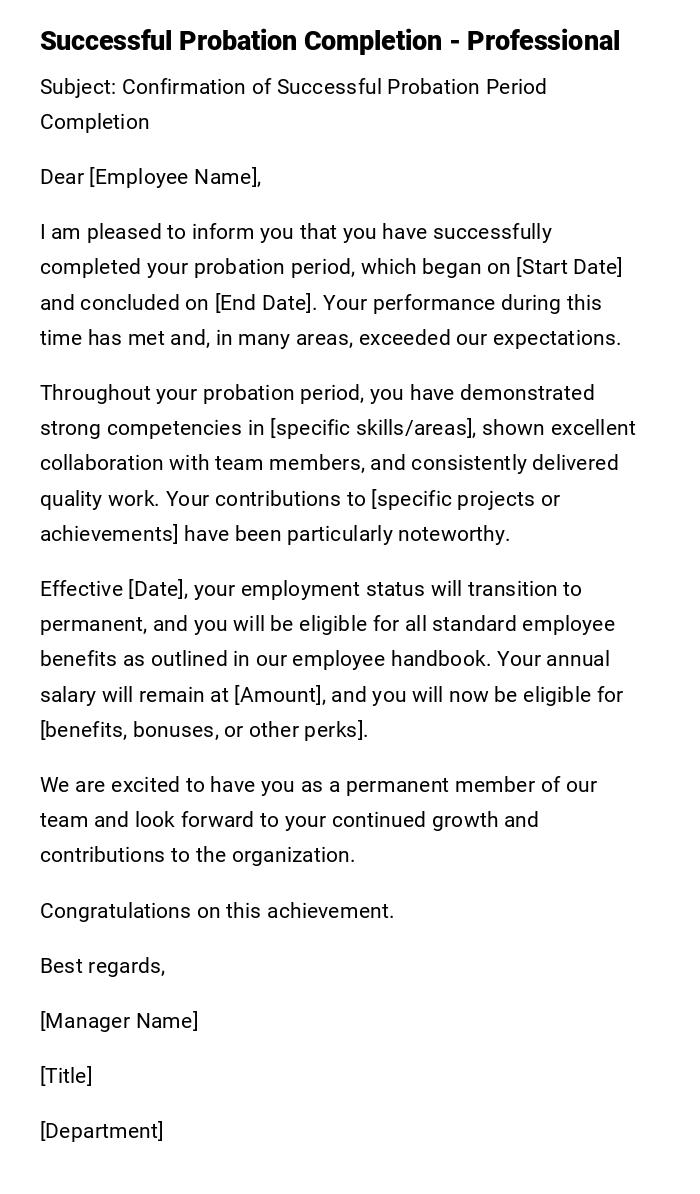
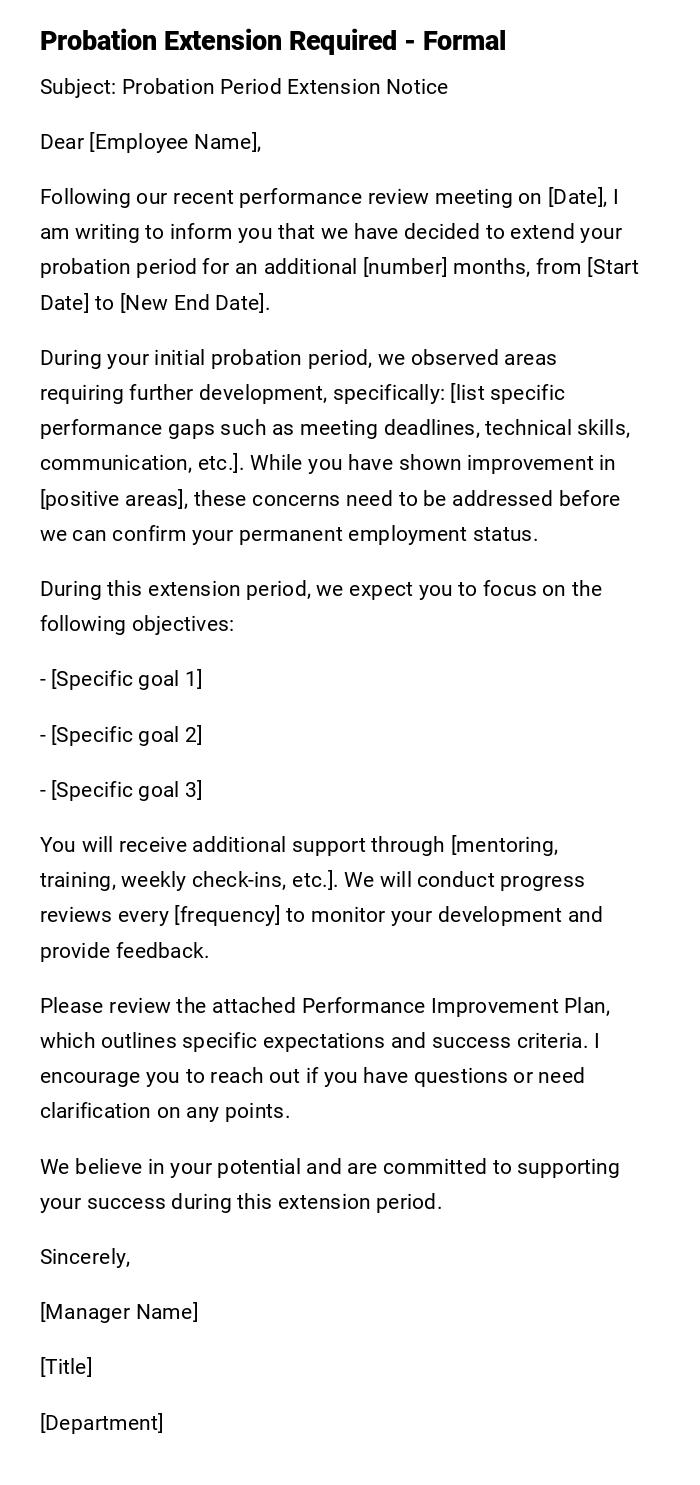
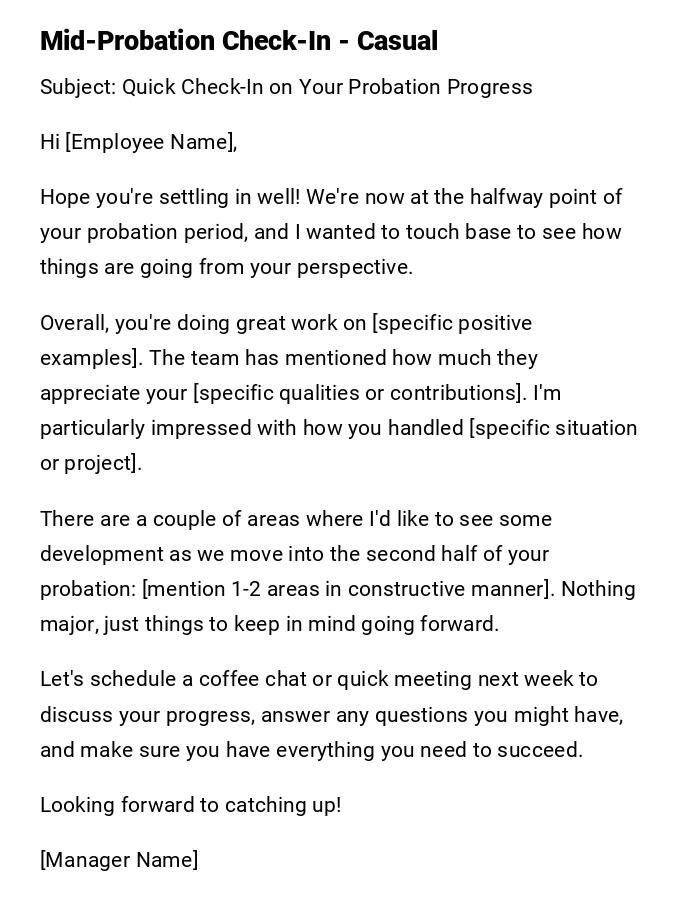
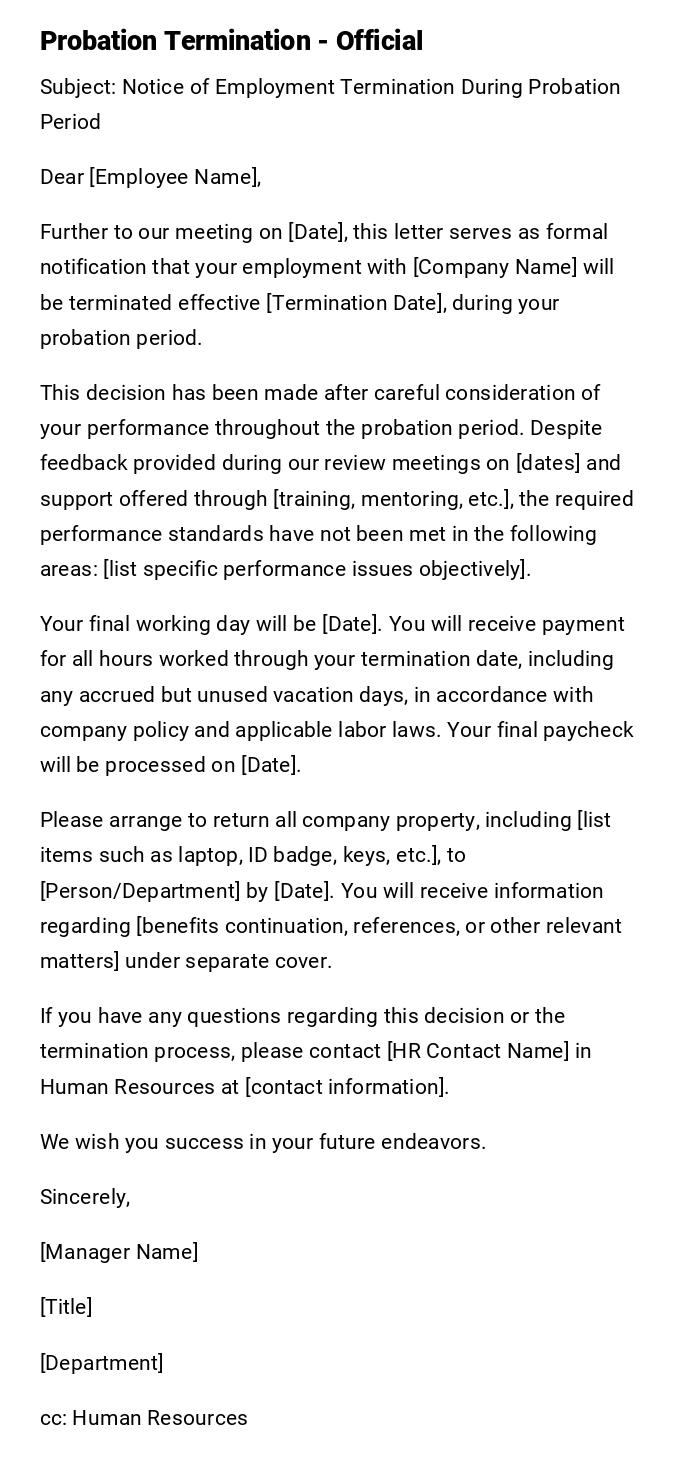
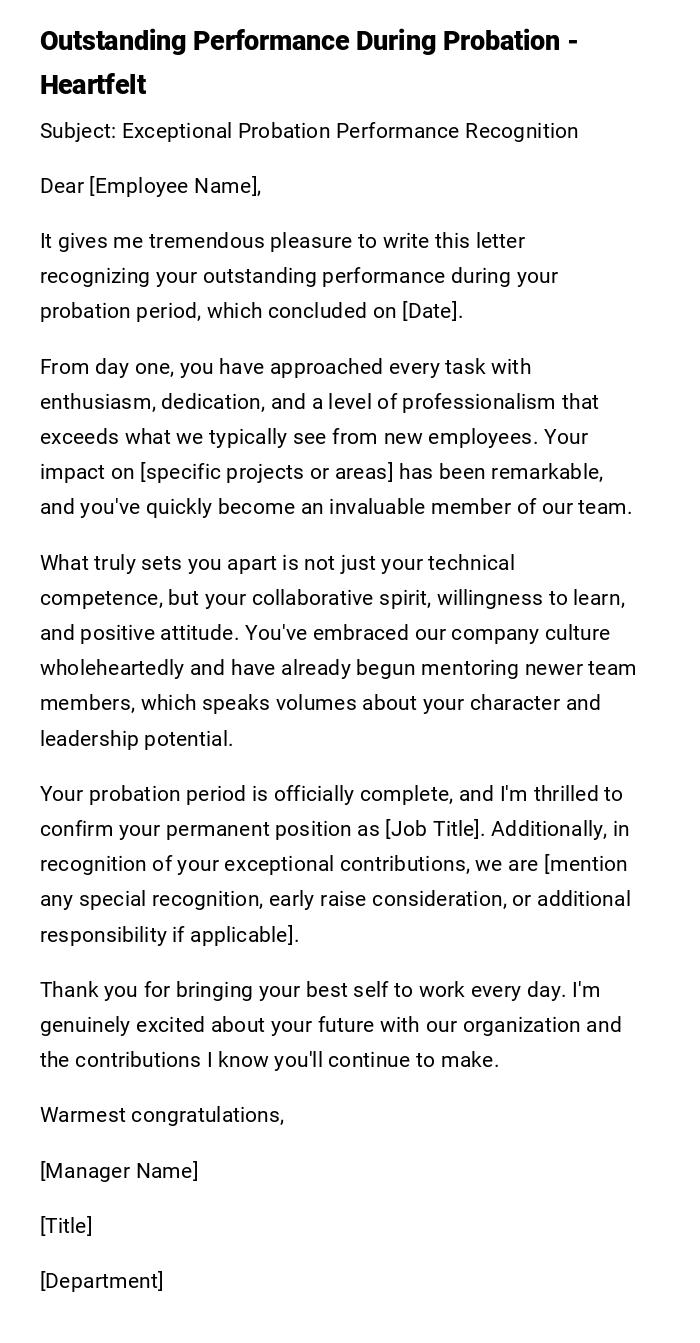
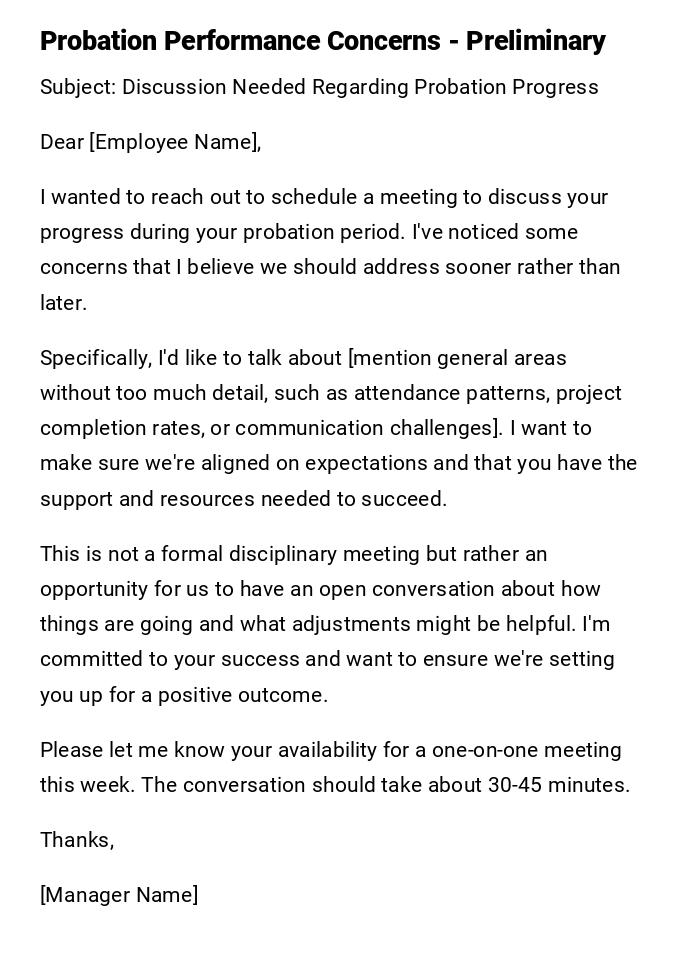
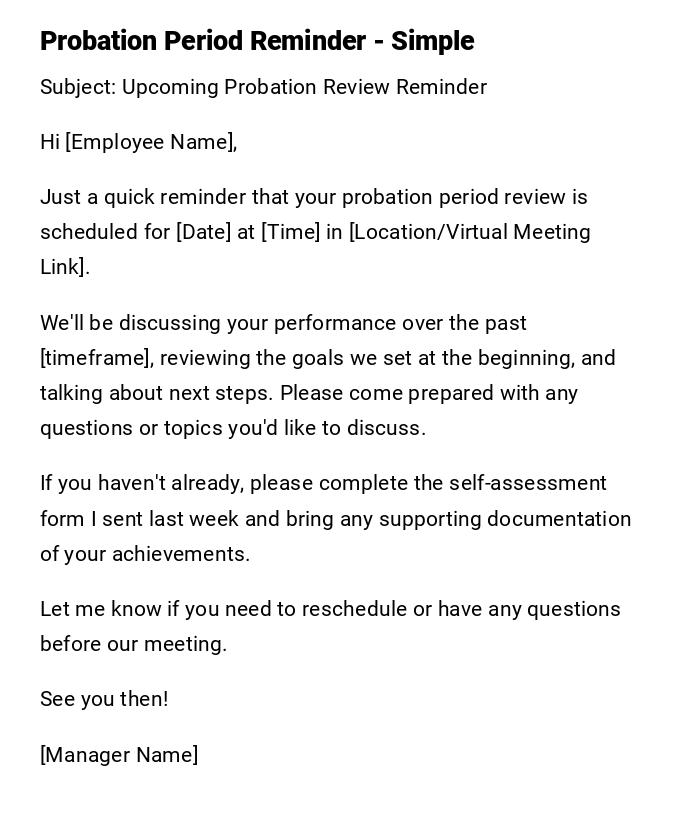
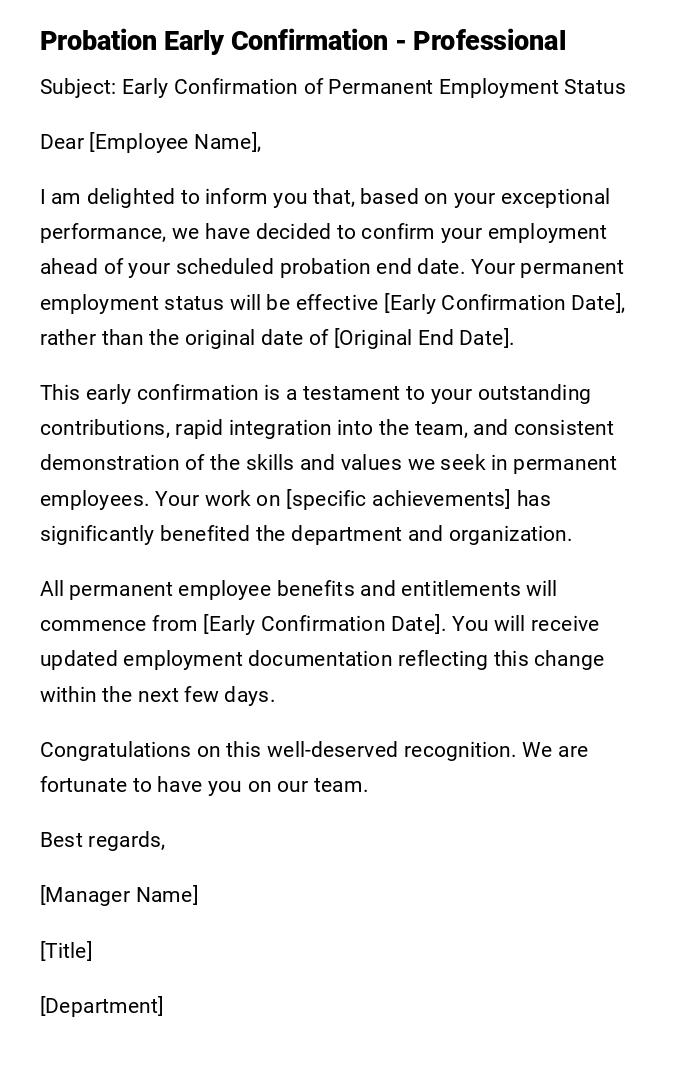

 Download Word Doc
Download Word Doc
 Download PDF
Download PDF